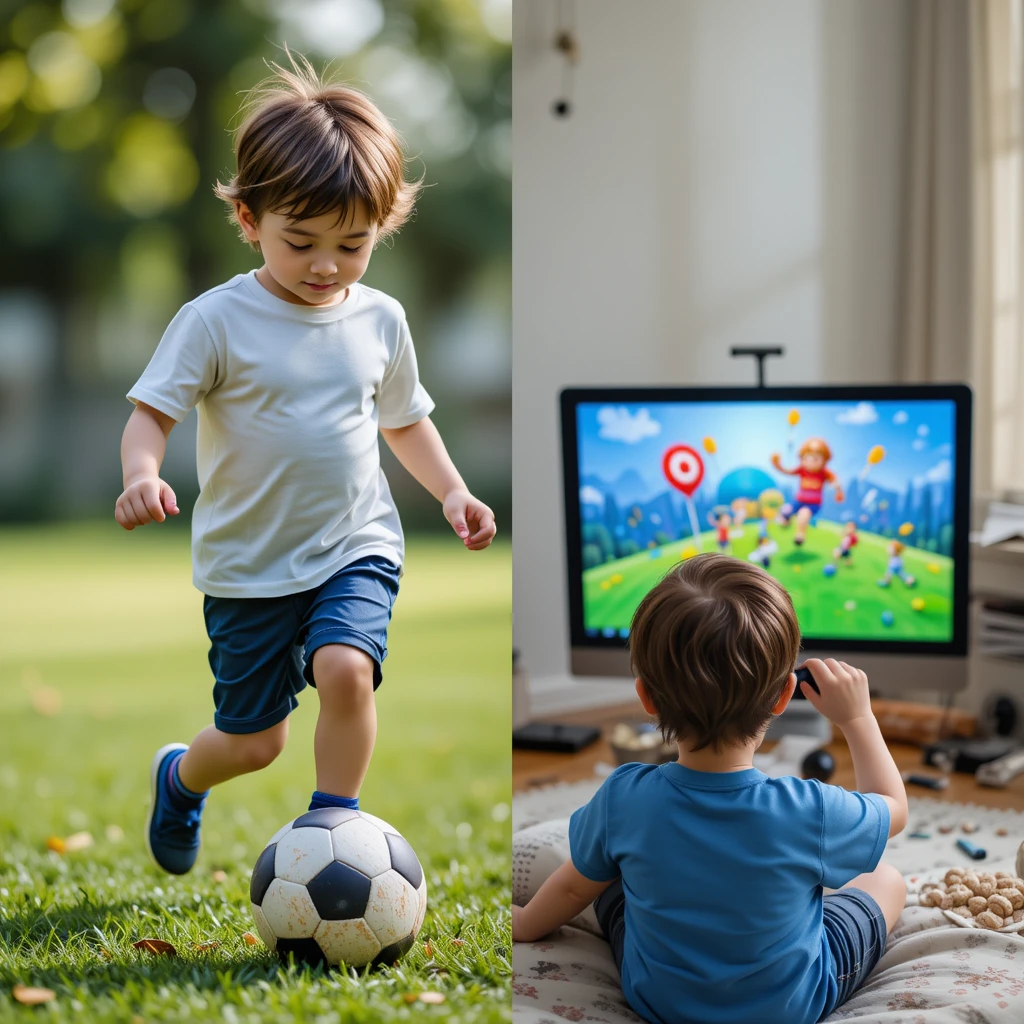Balancing Screen Time and Play Time in Daycare

In today’s digital world, screen time is a part of life. From smartphones and tablets to computers and televisions, kids are exposed to screens from a very young age. As technology continues to play an increasingly prominent role in our lives, many parents and daycare providers are grappling with the question: How much screen time is too much for young children, and how can we balance it with other forms of play?
As a parent, you may have concerns about how screen time is integrated into your child’s daycare routine. While screen time can offer educational benefits, it’s important to strike a healthy balance with more traditional forms of play. In this blog, we’ll explore the importance of balancing screen time with physical and imaginative play, and provide tips on how daycare settings can promote a well-rounded developmental experience for children.
Why Balance Matters: The Impact of Screen Time on Children
Before diving into how to find the right balance, it’s important to understand why this is such a crucial issue for young children. While technology offers educational opportunities and entertainment, excessive screen time can have negative effects on a child’s development, including:
- Delayed Social Skills: Too much screen time can limit face-to-face interactions with peers and caregivers, hindering the development of essential social skills like communication, sharing, and empathy.
- Reduced Physical Activity: Prolonged screen time can lead to sedentary behavior, which may contribute to health issues like obesity and reduced motor development in young children.
- Difficulty with Emotional Regulation: Excessive exposure to screens, especially when it involves violent or overstimulating content, can make it harder for children to manage their emotions or behavior.
- Impaired Sleep Patterns: Studies have shown that too much screen time, especially close to bedtime, can interfere with sleep quality by disrupting the body’s natural sleep-wake cycle.
While screens are not inherently bad, the key is moderation and ensuring they are used as a tool for learning rather than entertainment that takes up most of a child’s time.
The Importance of Play: Why Kids Need Play Time
Play time, on the other hand, is essential to a child’s development. Whether it’s physical play, imaginative play, or creative activities, play offers numerous benefits for young children, including:
- Physical Development: Active play such as running, jumping, and climbing helps children develop motor skills, strength, and coordination. It also encourages healthy habits, such as exercise and staying active.
- Cognitive Growth: Play stimulates cognitive development by encouraging problem-solving, imagination, and critical thinking. Activities like building with blocks, doing puzzles, or playing pretend foster creativity and learning.
- Social and Emotional Skills: Through interactive play with peers, children learn to share, negotiate, and collaborate. They also learn how to cope with frustration, resolve conflicts, and understand the emotions of others.
- Language Skills: When children engage in play, especially with others, they expand their vocabulary and practice communication skills. Pretend play, for instance, encourages the use of language in creative and meaningful ways.
In short, play time is integral to a child’s overall development, supporting their physical, emotional, cognitive, and social growth in ways that screens simply cannot.
How Daycare Can Help Balance Screen Time and Play Time
For parents concerned about how screen time is used in daycare, it’s important to remember that daycare providers play a key role in ensuring that children receive a well-rounded developmental experience. Here are some ways daycare settings can achieve the balance between screen time and play time:
1. Setting Screen Time Limits
Daycare centers can implement clear guidelines around screen time to ensure it doesn’t dominate the day. Many daycares limit screen time to specific periods—perhaps during quiet time or as a reward for good behavior—rather than allowing it to take up large chunks of time.
- Screen Time for Learning: When screen time is included in the curriculum, it should be purposeful and educational. Age-appropriate apps, videos, or games that promote learning—such as teaching letters, numbers, or animal names—can be beneficial, but they should never replace active play or social interaction.
- No Overuse: Set specific guidelines on the duration of screen time. Experts recommend no more than one hour per day for children aged 2 to 5 years old, and daycare providers can ensure that this recommendation is followed.
2. Prioritize Active Play
Daycare is an ideal environment for children to engage in active play, which is crucial for their physical development. Providers can prioritize outdoor activities, games, and creative play to help kids burn off energy and improve their motor skills.
- Outdoor Play: A great way to balance screen time is to encourage outdoor play. Whether it’s running around the playground, playing tag, or exploring nature, outdoor activities promote physical development and socialization.
- Group Games: Group games like musical chairs, cooperative obstacle courses, or ball games allow children to work together, develop teamwork, and practice sharing—all while staying active and engaged.
- Creative Play: Daycares can foster creativity through art projects, pretend play, and building activities, which encourage imaginative thinking and problem-solving.
3. Encourage Social Interaction
A key component of emotional and social development is interaction with others. Daycares are the perfect setting for children to practice sharing, taking turns, and solving problems with their peers. Screen time, while educational, does not offer the same social opportunities.
- Collaborative Activities: Daycare centers can provide opportunities for collaborative play, where children work together on projects or play games that require communication and teamwork. This helps build emotional intelligence, such as empathy, self-awareness, and the ability to navigate complex social dynamics.
- Group Storytelling: Storytime is another excellent activity where children can engage with each other while developing their language and social skills. This fosters interaction, imagination, and listening skills.
4. Role of Caregivers in Modeling Healthy Habits
Caregivers play a crucial role in setting boundaries and being role models for children when it comes to screen time. Daycare staff should be aware of their own screen use and how it influences children’s behaviors.
- Limit Caregiver Screen Use: Daycare providers should avoid using screens during the day, except when it's time for educational content. When caregivers model positive behavior—such as limiting phone use or not using screens excessively—they show children that there are many ways to engage without technology.
- Engaging in Play: Caregivers should be active participants in playtime. When children see caregivers engaging in activities like building blocks, reading, or playing outside, they are more likely to follow suit and engage in non-screen-based play.
5. Promote a Variety of Activities
A well-rounded daycare program should offer a mix of screen time, physical activities, quiet time, and creative play. By providing a variety of experiences, children can engage in different types of learning and socialization, ensuring that they’re developing all aspects of their growth.
- Balanced Routines: A typical day should include a combination of screen-based activities, outdoor play, art, reading, and group games. A structured routine helps ensure that no single type of activity dominates the day.
- Mindful Technology Use: When screen time is used, it should be purposeful and limited, such as using educational apps or videos that teach numbers, letters, or colors.
Conclusion
Balancing screen time and playtime in daycare is essential for promoting healthy development in children. While screens can offer educational benefits, physical, social, and emotional growth is best supported through active and imaginative play. By setting limits on screen time, prioritizing outdoor and group activities, and promoting creative expression, daycare centers can provide a well-rounded environment that fosters all aspects of a child’s growth.
As a parent, you can feel confident knowing that daycare providers are working to create a balance that benefits your child. By encouraging both screen time and hands-on play, daycare can help ensure your child’s development is well-rounded, engaging, and enriching.




